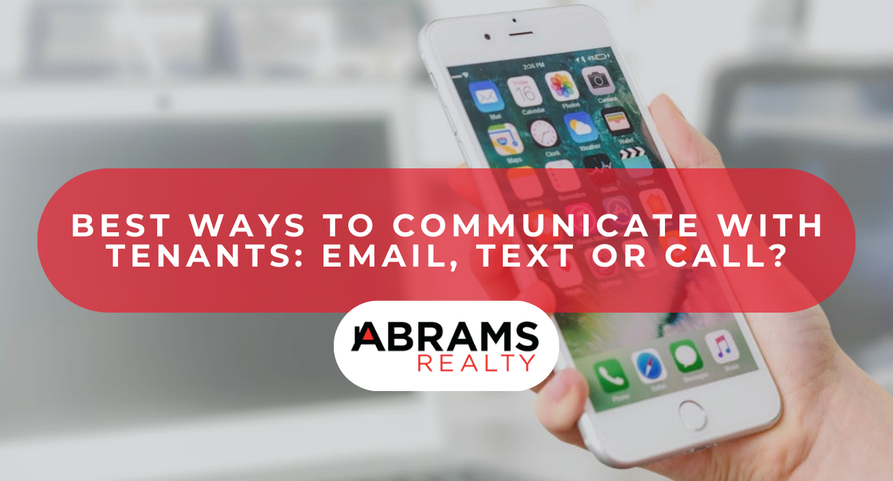Key Takeaways
Clear, effective communication is essential to avoid misunderstandings, delays, and tenant dissatisfaction in rental property management.
Each method—email, text, and phone—has its strengths and weaknesses. Choosing the right one depends on the situation’s urgency and complexity.
Set expectations early and stay consistent in your communication practices to build trust and professionalism.
Respect tenant preferences when possible, but always follow up important conversations with written confirmation.
Clear and effective communication is one of the most important parts of managing rental properties.
Without it, misunderstandings, missed payments, and unresolved maintenance issues can easily lead to tenant dissatisfaction and landlord frustration.
Communication is not just about sharing information; it also sets the tone for your landlord-tenant relationship.
As a landlord, choosing the right way to communicate can save you time, avoid disputes, and improve tenant retention for the long-term.
Abrams Realty has put together this article to help landlords like you understand the pros and cons of different communication methods.
Whether you're a seasoned landlord or just starting out, learning how to effectively use email, text, or phone calls will help you run your rental business more smoothly and professionally.
Choosing the Best Way to Communicate With Tenants
Each communication method, email, text, and phone call, serves a different purpose. Knowing when and how to use each one can lead to faster responses, better record-keeping, and stronger relationships with tenants.
Below is a breakdown of the advantages and drawbacks of each method, along with best practices for landlords.
Email Communication
Pros:
Documentation: Email provides a written record of your conversations. This is important for protecting yourself legally and staying organized. If a tenant claims they didn’t receive a notice, you can show proof that you sent it.
Professional Tone: Email tends to keep communication formal and professional. This helps you maintain boundaries and avoid misunderstandings.
Attachments: You can attach lease agreements, payment receipts, or maintenance instructions easily.

Cons:
Slower Response Times: Tenants may not check their email as frequently as other communication methods.
Spam Filters: Sometimes emails go to spam or get missed.
Not Ideal for Urgent Issues: If something requires an immediate response, email may not be fast enough.
Best Use Cases:
Lease agreements and updates
Payment reminders and rent increases
Non-urgent maintenance notices
Move-in or move-out instructions
Text Messaging
Pros:
Fast and Convenient: Most people check text messages quickly, making it a great way to get a fast response.
Good for Short, Clear Messages: It’s a quick way to confirm appointments, send reminders, or notify tenants of non-emergency issues.
Less Intrusive Than a Phone Call: Tenants can reply when they are available.
Cons:
Limited Space: It's not suited for long messages or complex information.
No Formal Record: While you can take screenshots, it’s harder to organize and store text messages compared to email.
Can Become Too Casual: Some tenants may respond in an unprofessional way if they feel the tone is too informal.
Best Use Cases:
- Appointment reminders for maintenance or inspections
- Simple rent reminders
- Quick updates like "Your package has arrived" or "Maintenance is on the way"
Confirming availability or asking yes/no questions
Phone Calls
Pros:
Best for Urgent or Sensitive Matters: If there’s an emergency, a phone call is the fastest way to get someone’s attention.
Personal Touch: Hearing your voice helps build trust and shows that you care about the tenant’s concerns.
Clarifies Misunderstandings Immediately: You can explain things in real time and answer questions on the spot.

Cons:
No Written Record: Unless you follow up with an email or written summary, there’s no proof of what was said.
Can Interrupt Tenants: Some people don’t like getting calls, especially during work hours or at night.
Hard to Keep Track: It’s easy to forget details from a conversation if you don’t write them down.
Best Use Cases:
Emergencies or safety concerns
Conflicts or complaints that need a human touch
Complex topics that require back-and-forth discussion
Final warnings or serious lease violations
Tips for Choosing the Right Method
Match the Message to the Method: Use text for simple updates, email for documentation, and calls for urgent or personal matters.
Set Expectations Early: Let tenants know at the beginning of the lease how you plan to communicate and what to expect.
Respect Boundaries: Avoid texting or calling late at night unless it’s an emergency.
Follow Up in Writing: If you have a phone conversation about an important matter, follow up with an email to confirm what was discussed.
Stay Consistent: Choose one main way to communicate for regular updates, and stick with it. This helps tenants know where to look for important information.
What Tenants Prefer
Keep in mind that different tenants prefer different communication styles. Some may want everything in writing, while others respond best to quick texts.
You don’t have to change your approach for each person, but being flexible can help you build better relationships and keep tenants happy.

A good approach is to ask tenants during the lease signing which method they prefer for different types of communication.
Then, make a note of it in their file. This shows respect for their preferences and can lead to better cooperation.
Bottom Line
Effective communication with tenants can make or break your rental business. Email is best for detailed information and record-keeping.
Texting works well for fast, short messages. Phone calls are ideal for emergencies or personal conversations.
Using the right method at the right time reduces confusion, saves time, and helps keep tenants satisfied.
Abrams Realty helps landlords manage tenant communication in a professional and efficient way. Our experienced property managers handle emails, texts, and calls so that nothing gets missed.
We keep clear records of all communication and ensure that tenants get timely and respectful responses.
If you're tired of juggling different communication tools or want to make sure everything is handled correctly, we can help.
Let Abrams Realty take the stress out of managing tenant relationships.
Contact us today to learn how our property management services can help streamline communication, reduce misunderstandings, and protect your rental business.


